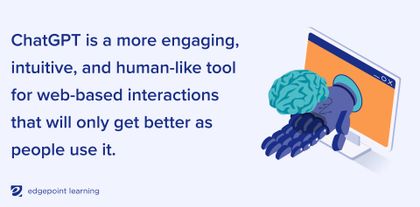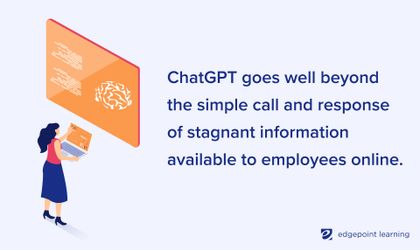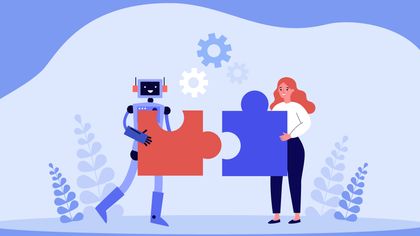What's The Future For ChatGPT And Employee Training?
🍿 6 min. read
In the past few months, it's been impossible to consume any kind of media without hearing about ChatGPT. It has been a long time since chatbot technology has received this much buzz, and with good reason. ChatGPT has upended stale, robotic interactions online, with big potential applications across a wide variety of industries, including training and education. Here's what you need to know if you're interested in ChatGPT and employee training uses.
What is ChatGPT?
Chat Generative Pretrained Transformer (ChatGPT) is a technology developed by OpenAI to more closely resemble natural speech. Unlike the sometimes awkward and stiff responses of your usual chatbot, this Large Language Model (LLM) technology is changing the way we interact with artificial intelligence.
Since its release in November 2022, users have tried everything from negotiating parking tickets to writing video scripts for financial management software with this tool. It also has broad applications for other industries, like the employee training market or education as a whole.
Put simply, ChatGPT is a more engaging, intuitive, and human-like tool for web-based interactions that will only get better as people use it.

How does ChatGPT work?
Unlike previous chatbots that use scripted responses to a set of questions or inquiries, ChatGPT functions a lot like regular conversation. Developers “trained” this program using reinforcement learning from human feedback (RLHF).
Just as humans change their speech patterns as they learn more about who they are talking to and what they are talking about, ChatGPT's human AI trainers use RLHF's system of rewards and positive reinforcement to create an adaptive bot capable of correcting itself. In some cases, ChatGPT is capable of admitting mistakes, clarifying intentions, and answering follow-up questions that are not specifically programmed in. This flexibility is the result of training on a large volume of internet-based information that includes casual patterns of speech.
How to access ChatGPT
For now, this technology is in beta testing and available to try for free on OpenAI's homepage.
It's important to remember that this is a research release that will undergo various tweaks and modifications as it is further developed. It's also likely to be monetized at some point, so it's worth trying out while it's in beta testing to see if it is useful.
If you know you love it already and want to dive in, ChatGPT Professional is in development, with potentially unlimited bot responses and no blackout windows.
ChatGPT and employee training: Potential uses
ChatGPT holds exciting possibilities for employee training. This type of digital performance support goes well beyond the simple call-and-response of stagnant information available to employees who are learning online. Here's what that may look like.

On-demand answers/training to employees
As one of the major tools that has evolved the way we work, this type of artificial intelligence is more responsive and flexible. The result? More engaging and adaptive on-demand training for employees that feature answers to follow-up questions and wider access to tailored information across the internet. ChatGPT can also send employees links to training materials and online videos for more information and explanation.
ChatGPT and employee training means that the decentralized and fluid tools of Web 3.0 are ready when your employees need answers.
Content generation for training
With a few prompts and guidance, ChatGPT is capable of generating course-related content for any type of training your employees need. This is best for topics that are somewhat evergreen and stagnant, as ChatGPT has some particular limitations built into it (more on that below).
Still, it's great for:
- Training systems and processes
- Answering a variety of questions on a topic
- Generating text responses that mimic natural speech patterns
You can specify a style of conversation, a level of understanding, and a goal for the training in ChatGPT to tailor your content even further.
Just-in-time customer service
ChatGPT can take over some customer service tasks in the same way other types of chatbots have. If your goal is to better train human customer service agents, though, this program works, too.
Because ChatGPT responds so quickly, human agents can also provide better, faster answers that are tailored to a customer's question (rather than a set script).
Limitations and cautions about AI in education
Keep in mind that no computer program can completely replace human interaction — even online. It's important to note that ChatGPT is not coming up with its own answers. It is not a reader or a writer — ChatGPT responds to questions or a set of parameters only based on what it has been programmed to know. Yes, it is fluid and flexible and produces text that reads more naturally, but it still lacks meaning and certain types of context that currently only humans responding can produce.
While it is possible to have a high-quality tool that supplements or adds to writing and training created by actual people, there are other risks in handing over all of the work to a computer.
The risk of misinformation
OpenAI has already clearly acknowledged that in the early stages of this program there is a risk of incorrect information being generated. Other pitfalls along these lines include:
- Ambiguous statements
- Overly wordy writing
- Incorrect assumptions when questions posed are not clear
Some of this misinformation may also be used to spread political propaganda that is harmful.
It is possible that these risks will be mitigated as the beta testing and research gathering stage continues, but there are no guarantees. When using this tool, always be aware that you'll need a human SME to double check its output.
Quite simply, ChatGPT is only as good as its programming. Poor quality information, or information that is not vetted can lead to inaccuracies that can snowball as people interact with the information.
Increased threat of malware and phishing
Because ChatGPT has more natural speech patterns, it's possible that malware and phishing will become more sophisticated and harder to detect. Hackers might even be able to develop some of their own tools using this type of technology, too.
Misuse of ChatGPT in education
Already one of the major red flags with ChatGPT is its use in academic settings. In some cases, college professors and secondary school teachers have noted that ChatGPT is capable of writing more clearly than its human counterparts. In fact, a college student at Princeton University has already developed an app that can detect when ChatGPT has generated text.
Another idea is digital watermarking on ChatGPT-generated content. This could significantly limit the potential for plagiarism in education.
Built-in limits
ChatGPT has specific built-in limits and parameters that could be challenging, if not understood well:
- It avoids certain content including graphic violence, explicit sex, and more
- It's trained to be “helpful, truthful, and harmless”
- It is not aware of any type of current events after 2021
- It requires specific, detailed instructions
These are not necessarily negative, but imagine trying to train a surgical procedure on an AI tool that does not allow for depictions of graphic violence. ChatGPT may not yet be able to see the difference without further training.
Let's talk training
When you are ready to learn more about ChatGPT and other types of on-demand, custom-made training, EdgePoint Learning is here. We specialize in using tools that help you get the training you need, when you need it — whether that's a simple consultation or designing new programs from the ground up.
